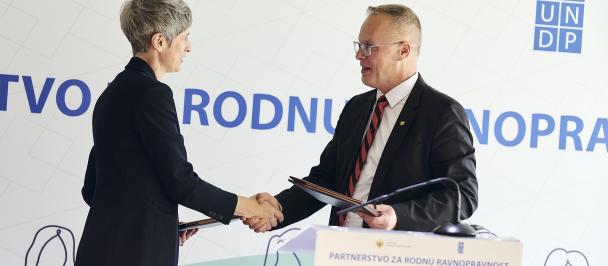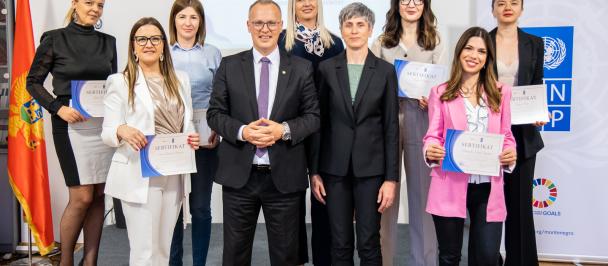Dialogues for dignity and equality
United in the fight against sexism, misogyny, and gender-based hate speech
December 12, 2023
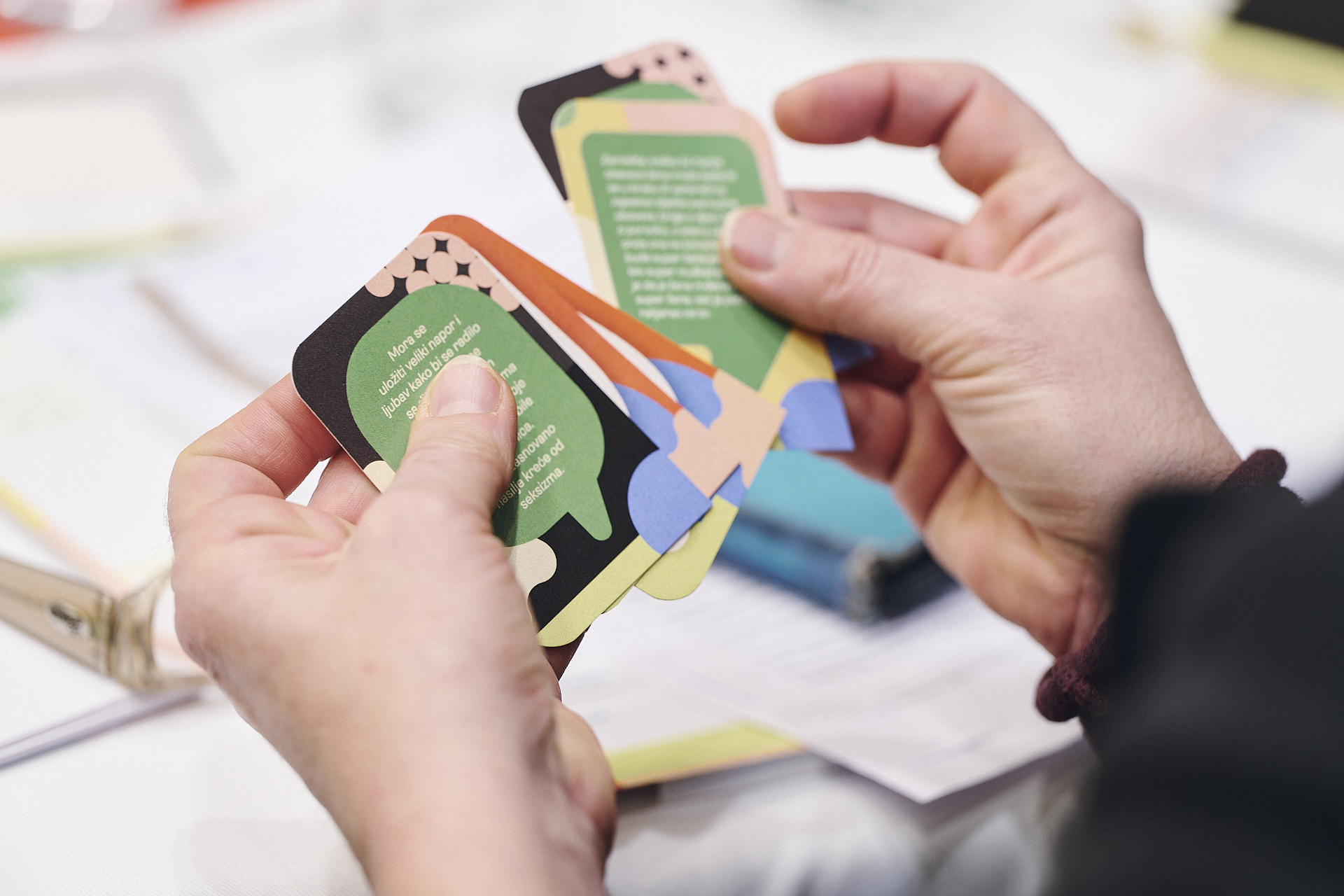
Podgorica, 12 December 2023 – At the core of sexism is the idea that certain individuals, often women and girls, are deemed less valuable because of their gender, leading to the dehumanisation and marginalisation of a significant part of the population, thereby endangering their human rights and dignity. That is why it is crucial to discuss the recognition of various forms of sexism as the first step in preventing gender discrimination. By doing so, we commit individually and collectively not to tolerate discriminatory attitudes, but rather to normalize equality in rights and inclusivity, rejecting behaviours that undermine human capital and development tailored to everyone, regardless of personal characteristics.
Key drivers of change in the process of combating sexism are cooperation, solidarity, and empathy, as they build alliances between institutions, media, NGOs, citizens, and advocates for gender equality. It is essential for us to unite and commit to personal and institutional action to ensure that all citizens of Montenegro have equal rights to fulfil their full potential, irrespective of gender. This message was conveyed at the conference “Dialogue against sexism, discrimination, and hate speech towards women and girls”, organized by the NGO SOS Helpline for victims of violence Podgorica, with the support of UNDP.
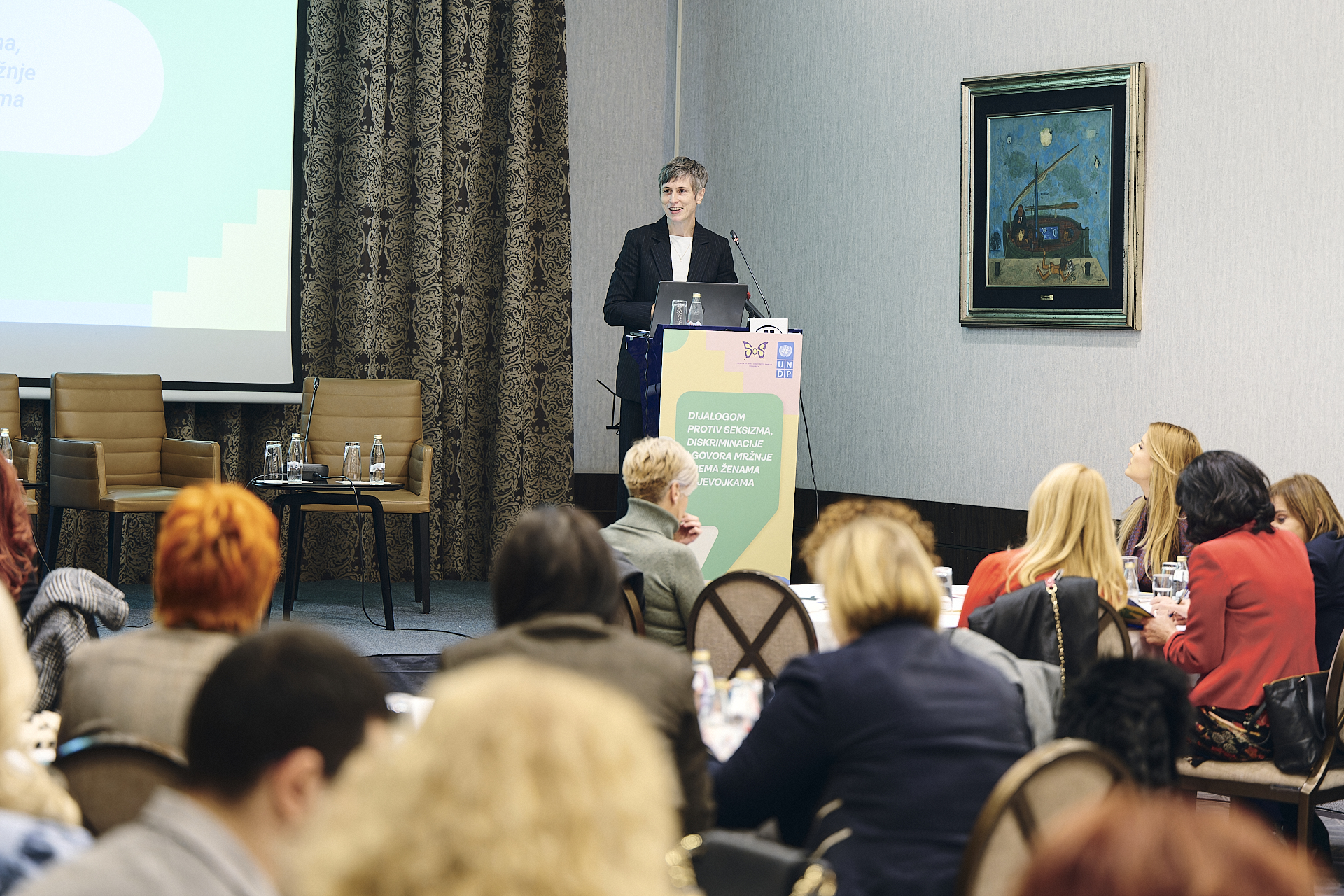
Empowering women and girls, as well as men, requires a deep connection with their personal experiences of discrimination and the challenges they face in their daily lives. To better understand the real context of sexism in local communities, a partnership between this NGO and UNDP led to organising 16 local dialogues in 10 Montenegrin cities, involving 200 people, including representatives of institutions, local authorities, media, civil society organizations, and citizens.
Ekaterina Paniklova, the UNDP Resident Representative in Montenegro, stated in the opening remarks that the dialogues revealed deeply ingrained harmful norms that limit the life choices of girls and women, as well as the lack of adequate responses to sexism. “Therefore, dialogues on the root causes and urgent action towards eliminating discrimination and harmful norms and behaviours are crucial for achieving equal opportunities and development for all”, she emphasized.
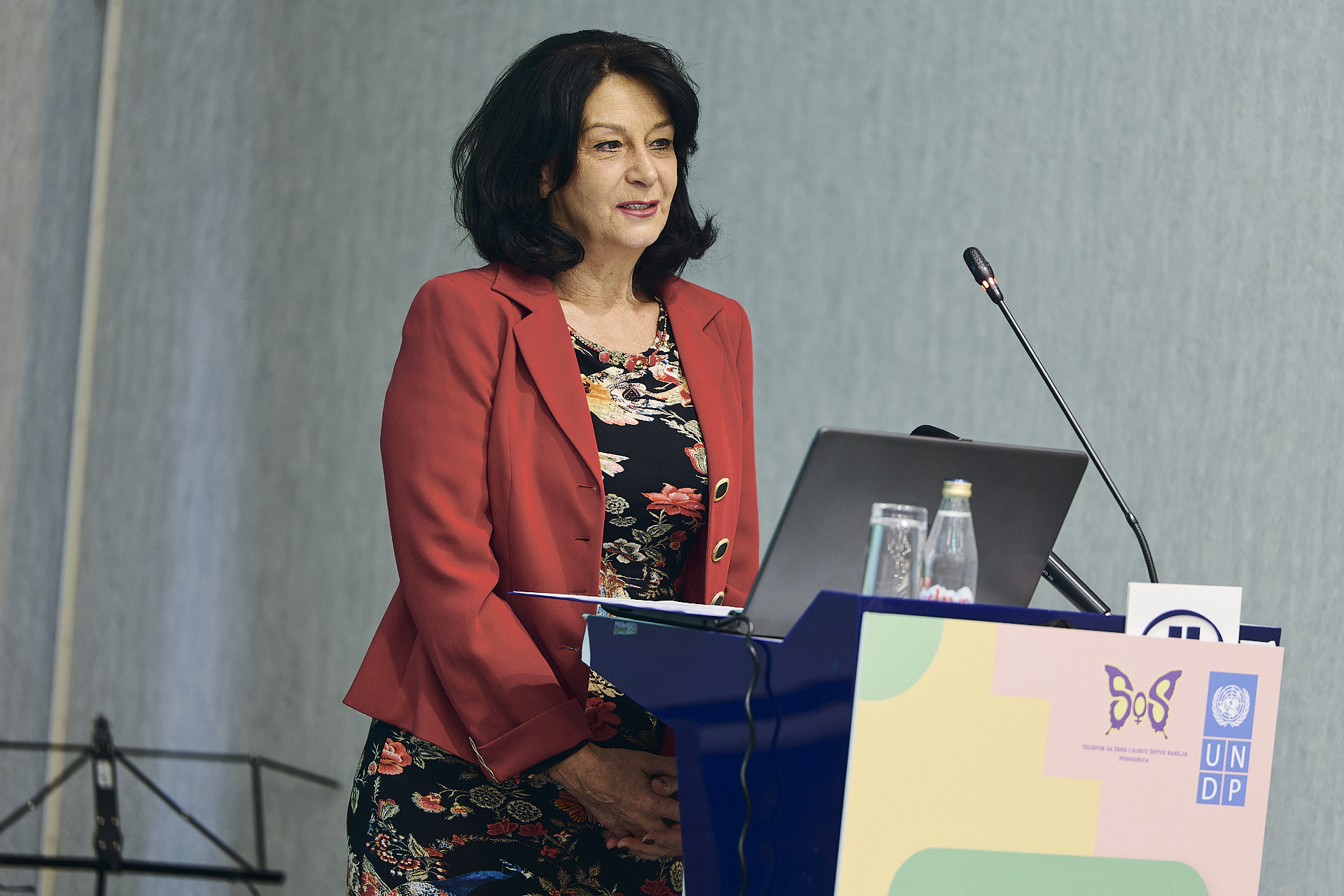
Biljana Zeković, the director of the NGO SOS Helpline Podgorica, emphasized that the dialogues provided a safe space where new levels and forms of sexism, often rarely discussed, were brought to light. “These were very emotional stories. Speaking about human rights in general, and particularly any form of sexism, discrimination, or violence, is very personal and emotional because it has far-reaching consequences”, she stated.
“The media should verify the source and accuracy of information first, and if they are reporting sexist hate speech, they should not do so unquestioningly. Instead, they should critically address sexist comments.”Participant in the dialogue
“Public figures must be aware of their role in shaping gender norms and, by setting an example, take responsibility for creating a society based on respect.”Participant in the dialogue
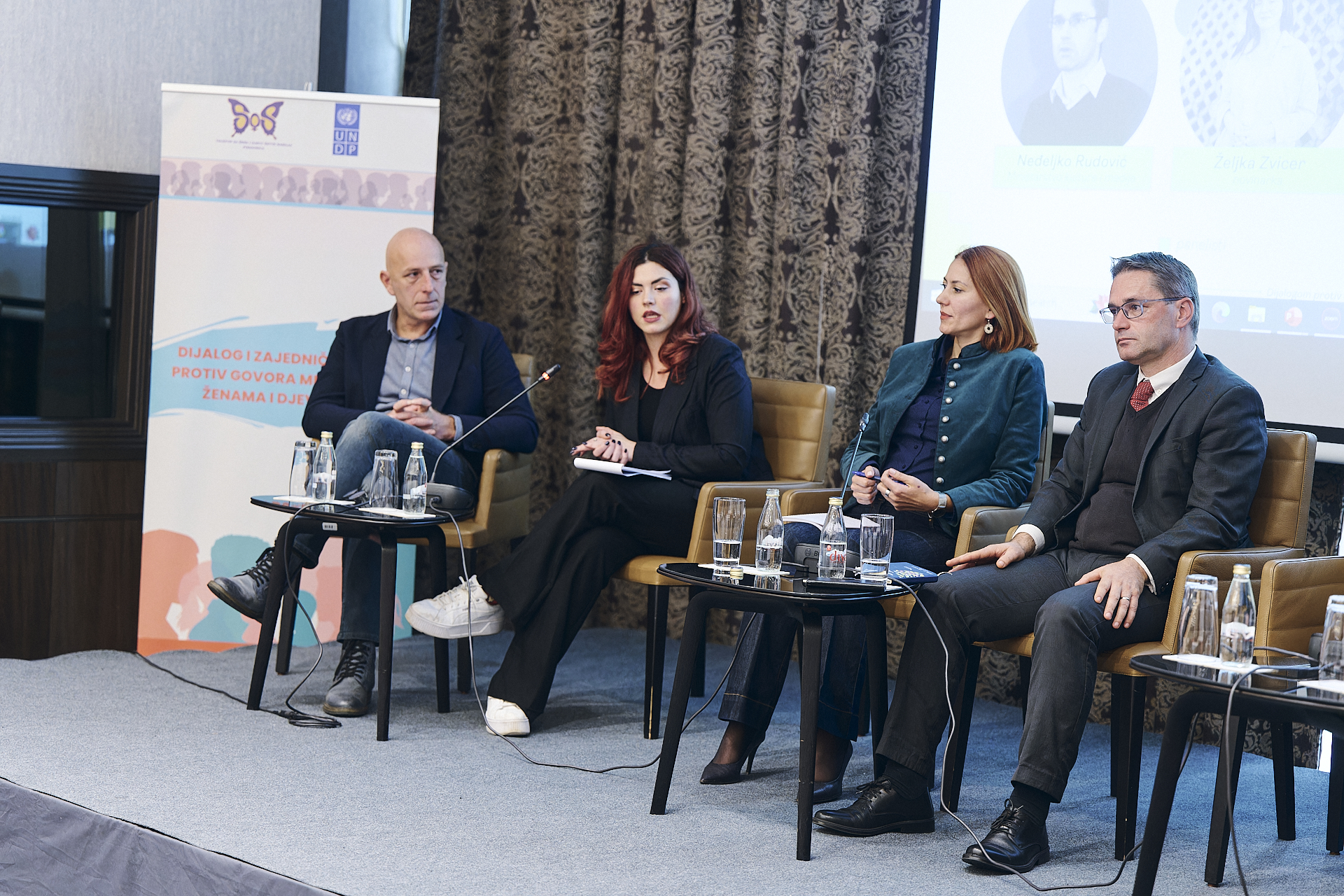
The public space reflects societal values
The panel on sexism and hate speech in public sphere was opened by journalist Dušanka Pejović, presenting conclusions from the report “Dialogue against sexism, discrimination, and hate speech towards women and girls”. The report emphasized the importance of making the public sphere gender-sensitive, as it is where the most visible examples of content degrading women and girls are found. Sexism is often ridiculed or underestimated in the public space, endangering social cohesion and diminishing the sense of trust and support.
During the conference, Drita Llolla, a Member of the Parliament of Montenegro, highlighted the need to engage more with public actors and their values and ideologies because they have the power to change society. “Existing power structures are maintained through ideological mechanisms that have subordinated the potential of women to their biology. Therefore, it is important to entrust important social processes, such as gender equality, to people of proven values.”
The conference emphasized that the media have a significant responsibility in combating sexism as they can be the voice of those whose stories are insufficiently told and raise awareness of the injustice and discrimination women and girls experience daily. Neđeljko Rudović, the Director General of the Directorate for media at the Ministry of Culture and Media, stated that the media are a significant point of change in Montenegro. £Gender equality in the Media Law should be recognized as a matter of public interest.”
Addressing the potential of the media to fight for a fairer society, journalist Željka Zvicer emphasized the importance of gender awareness in the media community. “Neither male nor female journalists are sensitized. Today, we more often encounter hidden forms of sexism and misogyny that most people do not recognize. Therefore, it is important to work on education, which is the only way to bring about changes.”
Predrag Nikolić, a representative of the Media Union of Montenegro, highlighted that women still do not have enough leadership positions in the media, and they are stereotypically represented in the discourse, further demonstrating that media do not sufficiently open their newsrooms to equal representation of women and men.
“We must speak in public, we must have the courage to act. We cannot expect everyone to react in the same way, but at least in our own environment, we can do a lot.”Participant in the dialogue
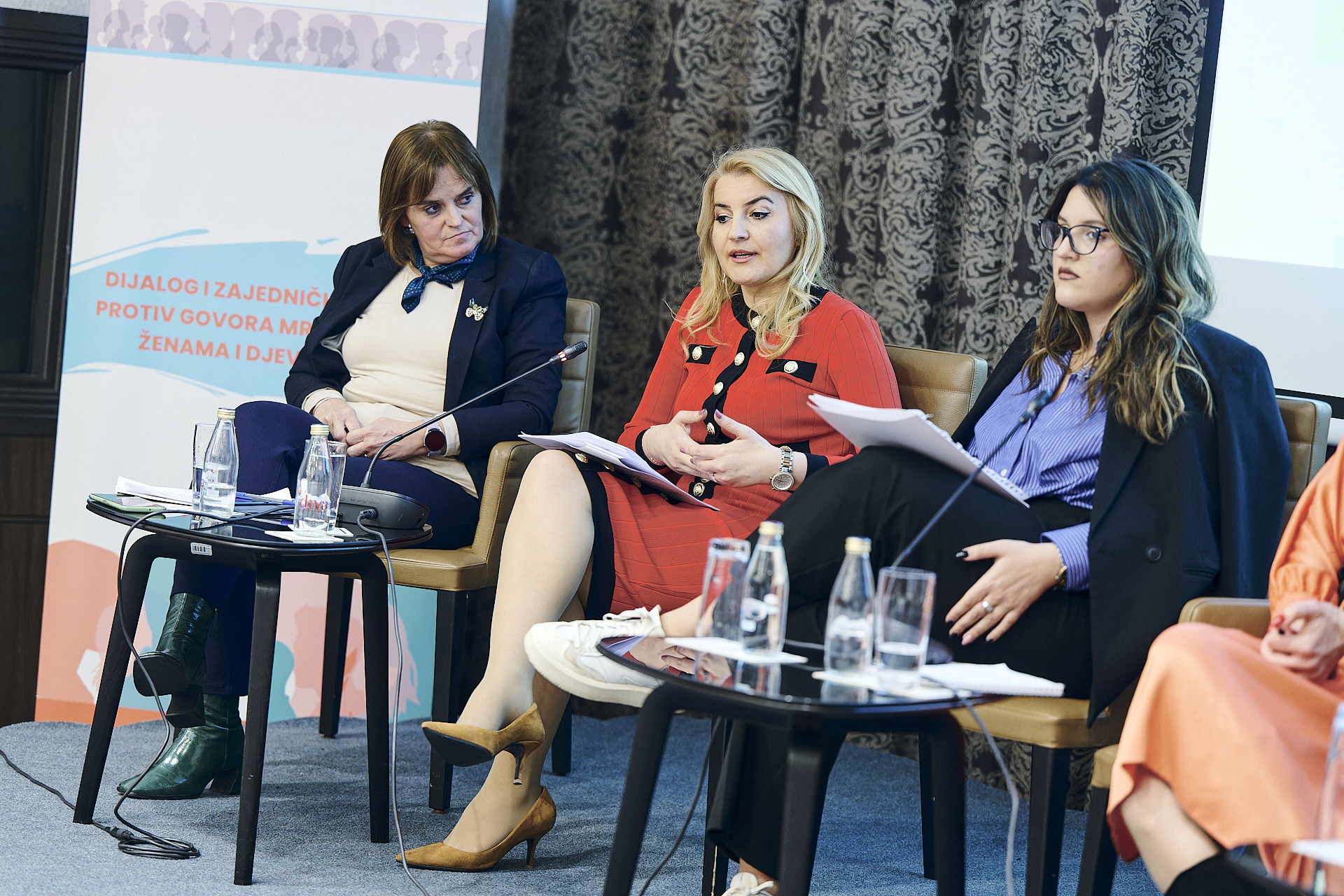
By reacting against sexism, misogyny, and hate speech, we empower others
Sexism limits individual potential and permeates every sphere of society – family, education, work. Conference participants agree that confronting sexism, misogyny, and gender-based hate speech requires concerted efforts, driven by a clear goal of creating a society of equality and equal opportunities.
Representative of the Ministry of Human and Minority Rights, Biljana Pejović, stated that change requires personal and institutional responsibility. “A holistic approach is necessary, involving more effective law enforcement and individual responsibility for anyone who violates the law.”
The importance of education was particularly emphasized by Nerma Dobardžić from the Institution of the Ombudsperson for Human Rights, advocating for reliance on the education system to raise awareness about sexism, misogyny, and gender-based hate speech. “We should combat sexism through preventive and proactive measures because it can lead to violence based on hatred towards gender. Civic education and human rights should be taught from basic education as mandatory subjects, primarily to recognize discrimination and protection mechanisms.”
It was also emphasized that sexism in the workplace is a serious problem in our society, manifested through discrimination, lack of support, and limiting women in professional advancement. Đina Janković, representative of the Association for Occupational Safety, stated that sexism affects the emotional well-being and productivity of employees, but employers do not take it seriously enough. “If a woman reacts in the workplace, she usually faces condemnation. Sexist comments often escalate into bullying. Therefore, it is essential for the work environment to recognize it as a problem. If a person resists, they are often ostracized.”
Highlighting the need to deconstruct gender stereotypes and build a value system focused on respecting human rights and gender equality, sociologist Andrija Đukanović emphasized that young people should lead the changes. “Younger generations change perception. Resistance is growing among women and girls not to succumb to patriarchal phenomena in society.”
In this context, law student Aleksandra Obradović stated that it is important for young people to surround themselves with positive role models who can inspire them to change themselves and their environment. Young people need a supportive environment where, united by a shared vision of equality, they can create an inclusive society. “Through our personal examples, we should help and show our peers how to react. I work on that and learn every day, trying to express my opinion publicly.”
“I immediately responded to sexist comments I faced, and I have no regrets about it because it is an example of how I can empower other women and girls.”Law student, Aleksandra Obradović
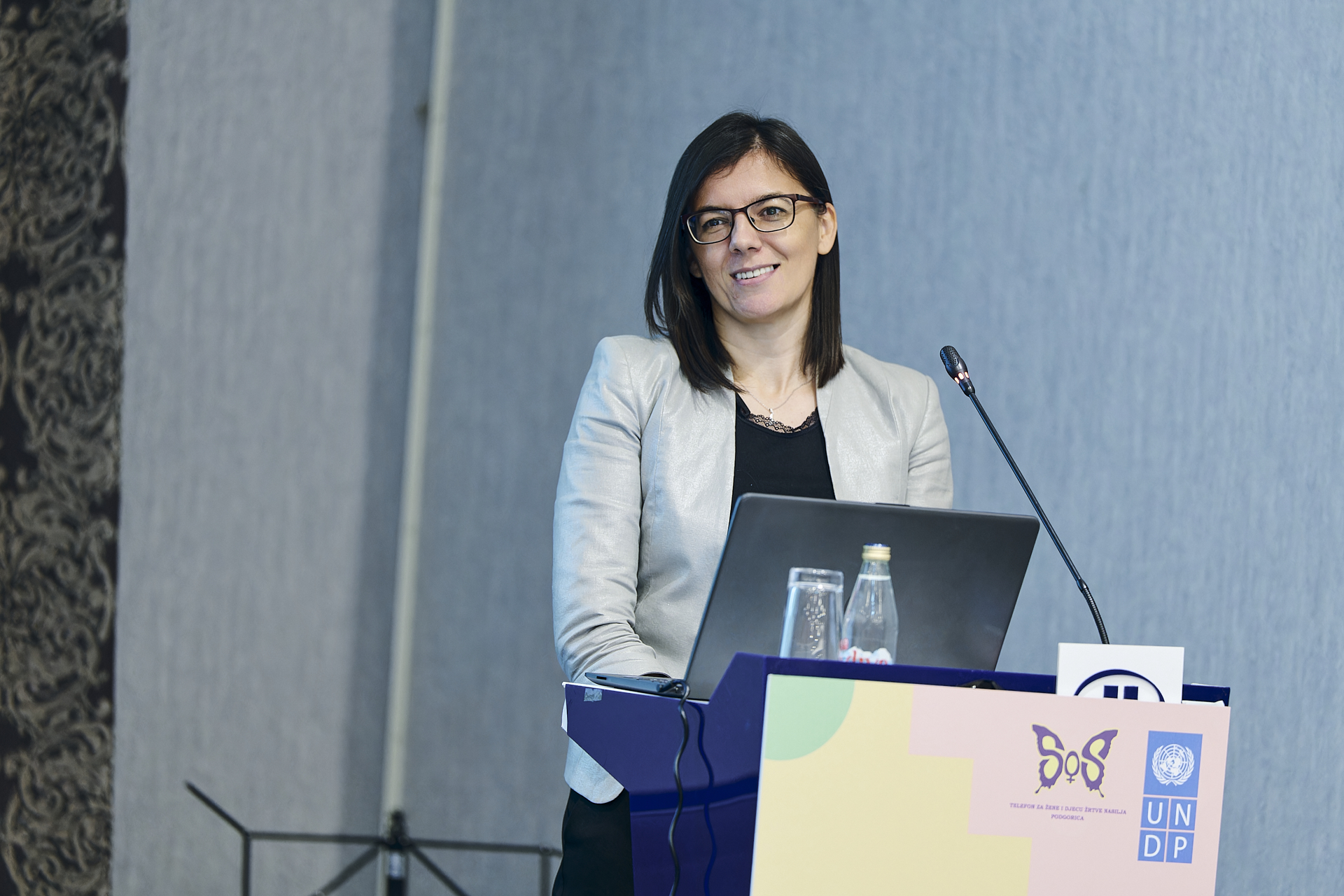
Local dialogues as a symbol of determination in the fight for gender equality
Authentic insights from the field have been summarized in the report, which represents a kind of map of real-life stories of women and men in Montenegro, as well as societal norms, patterns, pressures, and discrimination resulting from gender inequality, manifested through sexism, misogyny, and hate speech. Jelena Miljanić, Program Manager at UNDP, stated that personal responsibility to work on this topic every day is crucial. “It is important to recognize sexism, and after recognition, we must be aware that we can never normalize sexism but should react. Dialogues are an example of how through conversation and alliances, with sincere intentions, we need to advocate even more strongly and firmly for gender equality.”
The event was symbolically closed with a performance by poet Lejla Kašić, who, with her Anthem of Women, conveyed the message that the value of a girl, a woman, cannot be determined by patriarchal norms, but that our only measure is equality in rights and dignity, regardless of our particularities, including gender.
Based on personal stories from the dialogues, recommendations have been developed to help everyone in society contribute to eradicating gender stereotypes and sexist attitudes, believing that every voice raised against sexism creates a wave of empowerment that encourages the adoption of values and behaviours aligned with inclusion, tolerance, and cohesion, tailored to each individual.
The conference was organized as part of the project “Promoting Dialogue and Joint Action to Combat Hate Speech”, implemented by the UNDP in Montenegro in collaboration with the Ministry of Human and Minority Rights, the Ombudsperson Institution, and the Ministry of Justice. The project is funded financed by UNDP Funding Window for Governance, Peacebuilding, Crisis and Resilience with contributions of Sweden and Luxembourg.

 Locations
Locations











